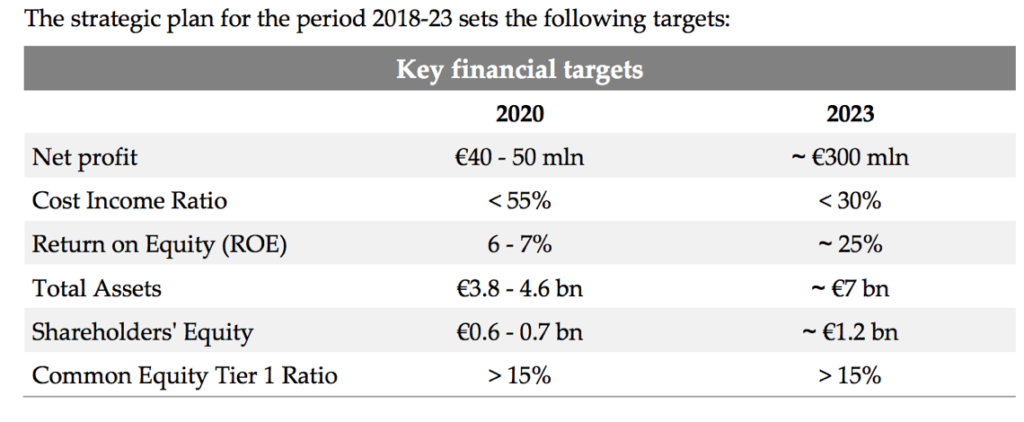 Spaxs, a Special purpose acquisition veichle listed on the Milan Stock Exchange which raised 600 million euros from investors last December, today unveils the strategic plan for 2018-2023 of the new bank that will be created from the business combination with Banca Interprovinciale, a small commercial bank which will be transferred in a bank specialized in underserved segments of the Italian SME market and will offer highly digitalised services to retail and corporate customers by means of an innovative business model (see here a previous post by BeBeez).
Spaxs, a Special purpose acquisition veichle listed on the Milan Stock Exchange which raised 600 million euros from investors last December, today unveils the strategic plan for 2018-2023 of the new bank that will be created from the business combination with Banca Interprovinciale, a small commercial bank which will be transferred in a bank specialized in underserved segments of the Italian SME market and will offer highly digitalised services to retail and corporate customers by means of an innovative business model (see here a previous post by BeBeez).
The deal will be subject to the approval of the Shareholders’ Meeting of Spaxs on 8 August on first call and on 31 August on second call (see here the press release).
The business combination will consist in the acquisition of a 99.3% stake in the capital of Banca Interprovinciale, partly paid in cash (about 44.7 million euros for a 79.9% stake) and partly as paper-to-paper exchange (19.4%). As for this latter step, Spaxs voted a 10.86 million euros capital increase for issuing 987,128 new ordinary shares of Spaxs at the price of 11 euros per share reserved to shareholders of Banca Interprovinciale who may pay delivering until a maximum of 8,411 shares of the bank. The total stake of Banca Interprovinciale to be acquired by Spaxs has been raised a few times since the previous announcement early in April (see here the press release), when a 91.3% was considered.
The new bank will operate through three synergistic divisions focused on sizeable, dynamic, profitable market segments, currently underserved by traditional operators: (I) lending to SMEs with high potential but with a suboptimal financial structure and/or a low rating or unrated, including the segment of non-performing SMEs (known as “Unlikely-To-Pays”); (ii) Corporate Non-Performing Loans (NPLs), secured and unsecured; (iii) digital direct banking services for retail and corporate customers
By 2023 the bank aims to achieve a net profit of about 300 million euros with a Return on Equity (ROE) of around 25%. The bank intends to achieve a satisfactory profitability level by 2020, the year in which it targets a profit of between €40-50 million and a 6-7% ROE. The high yield earned on the assets and the lean operating structure will enable the bank to achieve a Cost Income Ratio of less than 55% by 2020 and of less than 30% by the end of the plan.
Total Assets will grow from an initial target of 3.8 – 4.6 billion euros by 2020 to about 7 billions by 2023 with prudent risk management based on strict rules that envisage no mis-matching in maturities between assets and liabilities and a good diversification of funding sources. The bank intends to maintain a solid capital adequacy profile, with a CET1 ratio that will consistently exceed 15% throughout the plan period. This target includes a conservative dividend policy, with a growing distribution of dividends starting from 2022, once the bank’s shareholders’ equity has reached €1 billion, based on a pay-out ratio of 20% in 2022 and 25% in 2023.
The three business divisions will have different speeds of implementation: the NPL Division will be fastest, thus representing the main contributor to pre-tax profit in 2020. Thereafter, when fully operational, the bank will be well diversified, with a balanced contribution to the gross operating profit from NPLs and SMEs, while the Retail Division will have a crucial role in funding the bank’s activities.
As for the management, the promoter of the Spac, Corrado Passeram will be ceo. Andrea Clamer, who joined Mr. Passera in promoting Spaxs, will lead the Npl division after a 10 years’ experience in the sector, as he led Toscana Faenza and Banca Ibis teams as Head of the NPL Division. Enrico Fagioli Marzocchi will lead the SME Division, has long experience in corporate credit, including the management of non-performing loans and distressed assets. He has been, among other positions, Head of Non-Core Unit of the MPS Group and more recently CEO for the joint venture between Quaestio and Carved. Carlo Panella will lead the Direct Banking Division and will also be responsible for the Information Technology of the new bank. He has been General Manager of CSE and previously General Manager of WebBank. The top management team is completed by Francesco Mele, who has been appointed Chief Financial Officer & Central Functions. He has been CFO of the MPS Group and has long experience in investment banking with particular expertise in financial institutions.


